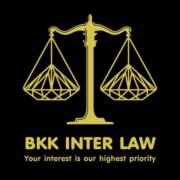Best Whistleblower & Qui Tam Lawyers in Don Mueang
Share your needs with us, get contacted by law firms.
Free. Takes 2 min.
List of the best lawyers in Don Mueang, Thailand
About Whistleblower & Qui Tam Law in Don Mueang, Thailand
Whistleblower and Qui Tam laws are legal mechanisms designed to protect individuals who expose wrongdoing, fraud, or corruption within organizations. In Don Mueang, Thailand, these laws can offer specific protections for those who bravely report illegal or unethical conduct, particularly relating to governmental or corporate fraud. Unlike some countries, Thailand does not have comprehensive Qui Tam statutes modeled after the United States, but anti-corruption legislation and whistleblower protection frameworks exist, especially in public sector matters. Whistleblowers play a vital role in maintaining transparency, upholding legal standards, and deterring misconduct in both public and private sectors.
Why You May Need a Lawyer
Individuals may seek legal assistance in whistleblower and Qui Tam cases in Don Mueang for several reasons. Common situations include reporting corruption within a government agency, exposing fraud by a private company dealing with government contracts, or facing workplace retaliation after making a report. Lawyers help whistleblowers navigate the complex legal framework, protect their rights, and ensure confidentiality. Legal counsel is also crucial for evaluating the legitimacy of claims, preparing documentation, dealing with law enforcement or regulatory authorities, and seeking compensation or remedy for retaliatory acts such as wrongful termination or harassment.
Local Laws Overview
Thailand has enacted several laws relevant to whistleblower protection, with a focus on anti-corruption efforts. The National Anti-Corruption Act and the Organic Act on Prevention and Suppression of Corruption outline procedures for reporting corruption and offer certain protections for those who come forward. In Don Mueang, as part of Bangkok, local regulations are aligned with national standards. Key aspects include:
- Mechanisms for confidential reporting to authorities such as the National Anti-Corruption Commission (NACC).
- Legal protection against retaliation, such as wrongful dismissal or harm due to a report.
- Limited or no rewards for whistleblowing, as Thailand does not typically follow the US Qui Tam bounty model.
- Emphasis on public official corruption, though private-sector whistleblowing may also be addressed in some contexts.
- Procedures for anonymous reporting, though these may limit certain protections or follow-up actions.
Anyone considering whistleblowing in Don Mueang should understand their rights and obligations as well as the potential personal and professional risks involved.
Frequently Asked Questions
What is considered whistleblowing in Don Mueang, Thailand?
Whistleblowing generally refers to reporting illegal, unethical, or corrupt actions within an organization to the authorities. This can include fraud, bribery, embezzlement, or regulatory violations, especially in relation to government bodies or projects.
Is there a specific Qui Tam law in Thailand?
Thailand does not have a direct equivalent to the United States Qui Tam law. However, anti-corruption and whistleblower protection laws exist, mainly targeted at government-related cases.
Who can be a whistleblower?
Any individual who possesses knowledge of misconduct or illegal activity can be a whistleblower. This includes employees, contractors, or even members of the public with relevant information.
What protections do whistleblowers have?
Laws in Thailand offer some level of confidentiality and protection from retaliation, such as threats to employment or personal safety, for those who lawfully report wrongdoing through proper channels.
Can whistleblowers remain anonymous?
Yes, whistleblowers may report anonymously. However, anonymous reports may limit the effectiveness of investigations or the ability to provide full protections to the whistleblower.
What should I do if I face retaliation for whistleblowing?
Seek immediate legal advice to understand your rights. You may also report the retaliation to relevant authorities, such as the National Anti-Corruption Commission or the police.
Are there financial rewards for whistleblowing in Thailand?
No. Unlike in the United States, Thailand does not generally offer financial incentives or rewards for whistleblowers under its current legal framework.
How do I report corruption or fraud in Don Mueang?
Reports can be made to national agencies such as the NACC, local police, or other relevant regulatory bodies. Some agencies provide hotlines or online submission systems for corruption complaints.
What evidence should I gather before making a report?
It is recommended to collect any documents, emails, photographs, or witness statements that support your claims. Legal counsel can help you prepare and evaluate the evidence before formal reporting.
How can a lawyer assist me with whistleblower matters?
A lawyer can advise on your rights, help you prepare and submit reports, communicate with authorities, ensure your protection, and represent you in any legal proceedings that may arise.
Additional Resources
- National Anti-Corruption Commission (NACC) - Specialized agency for corruption reporting and whistleblower protection.
- Office of the Public Sector Anti-Corruption Commission - Focuses on investigating misconduct within the public sector.
- Thai Lawyers Council - Provides referrals and initial consultations for legal issues including whistleblower matters.
- Local police stations in Don Mueang - For immediate risks or threats, contact your local law enforcement office.
- Nonprofit organizations such as Transparency Thailand - Offer guidance and support for individuals reporting corruption or seeking whistleblower advice.
Next Steps
If you are considering reporting wrongdoing or have already taken action as a whistleblower in Don Mueang, Thailand, your next steps should include:
- Consulting with an experienced lawyer who specializes in whistleblower and anti-corruption law to protect your interests.
- Gathering all relevant evidence and documentation to support your claims.
- Reviewing the appropriate channels for submitting a report so you are protected under the relevant laws.
- Assessing any risks to your safety or career and discussing possible protective measures with your lawyer.
- Keeping a detailed record of all communications, incidents, and developments related to your whistleblowing activities.
A qualified lawyer can ensure that your actions are legally sound, your rights are upheld, and that you are as protected as possible throughout the process. Do not hesitate to seek professional legal advice if you have any concerns about whistleblower or Qui Tam issues in Don Mueang.
Lawzana helps you find the best lawyers and law firms in Don Mueang through a curated and pre-screened list of qualified legal professionals. Our platform offers rankings and detailed profiles of attorneys and law firms, allowing you to compare based on practice areas, including Whistleblower & Qui Tam, experience, and client feedback.
Each profile includes a description of the firm's areas of practice, client reviews, team members and partners, year of establishment, spoken languages, office locations, contact information, social media presence, and any published articles or resources. Most firms on our platform speak English and are experienced in both local and international legal matters.
Get a quote from top-rated law firms in Don Mueang, Thailand — quickly, securely, and without unnecessary hassle.
Disclaimer:
The information provided on this page is for general informational purposes only and does not constitute legal advice. While we strive to ensure the accuracy and relevance of the content, legal information may change over time, and interpretations of the law can vary. You should always consult with a qualified legal professional for advice specific to your situation.
We disclaim all liability for actions taken or not taken based on the content of this page. If you believe any information is incorrect or outdated, please contact us, and we will review and update it where appropriate.









